Knowledge Management Analysis: Social Media Impact on Learning
VerifiedAdded on 2021/06/17
|11
|2942
|35
Essay
AI Summary
This essay provides an in-depth analysis of effective knowledge management within multinational corporations, emphasizing the role of social media platforms such as Facebook, Twitter, and LinkedIn. It explores how these platforms facilitate knowledge sharing, build social capital, and support innovation and problem-solving within organizations. The essay discusses the application of social media for employee training, content delivery, and community building, highlighting both the advantages and potential risks. It examines how social media tools support communication, collaboration, and connection, ultimately influencing organizational learning and competitive advantage. The analysis covers concepts like crowdsourcing, open innovation, and the development of social capital within global operations, while also addressing the importance of effective management and the potential downsides of using social media for knowledge sharing. The essay underscores the evolving landscape of knowledge management in the digital age and its implications for business development.
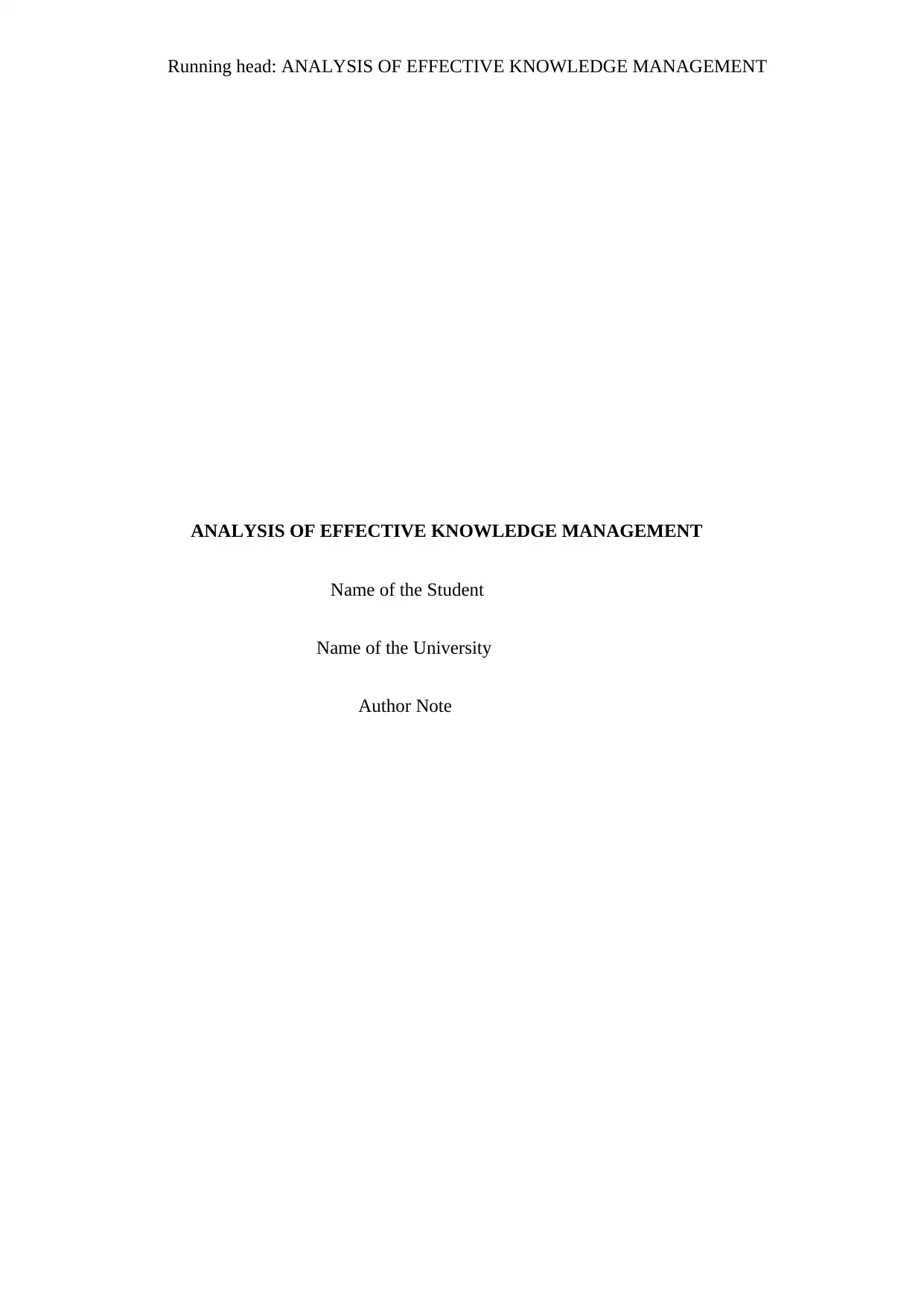
Running head: ANALYSIS OF EFFECTIVE KNOWLEDGE MANAGEMENT
ANALYSIS OF EFFECTIVE KNOWLEDGE MANAGEMENT
Name of the Student
Name of the University
Author Note
ANALYSIS OF EFFECTIVE KNOWLEDGE MANAGEMENT
Name of the Student
Name of the University
Author Note
Paraphrase This Document
Need a fresh take? Get an instant paraphrase of this document with our AI Paraphraser
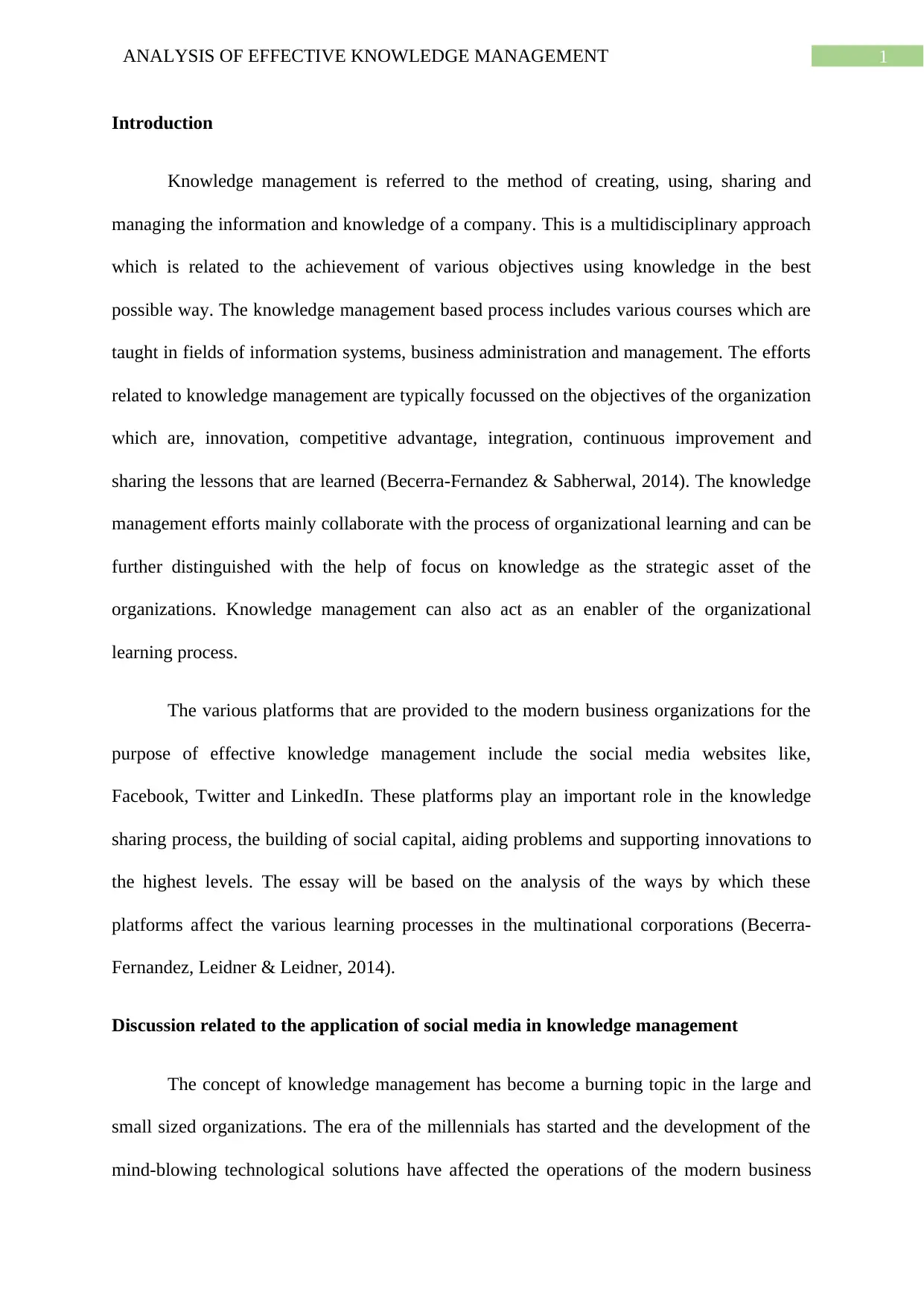
1ANALYSIS OF EFFECTIVE KNOWLEDGE MANAGEMENT
Introduction
Knowledge management is referred to the method of creating, using, sharing and
managing the information and knowledge of a company. This is a multidisciplinary approach
which is related to the achievement of various objectives using knowledge in the best
possible way. The knowledge management based process includes various courses which are
taught in fields of information systems, business administration and management. The efforts
related to knowledge management are typically focussed on the objectives of the organization
which are, innovation, competitive advantage, integration, continuous improvement and
sharing the lessons that are learned (Becerra-Fernandez & Sabherwal, 2014). The knowledge
management efforts mainly collaborate with the process of organizational learning and can be
further distinguished with the help of focus on knowledge as the strategic asset of the
organizations. Knowledge management can also act as an enabler of the organizational
learning process.
The various platforms that are provided to the modern business organizations for the
purpose of effective knowledge management include the social media websites like,
Facebook, Twitter and LinkedIn. These platforms play an important role in the knowledge
sharing process, the building of social capital, aiding problems and supporting innovations to
the highest levels. The essay will be based on the analysis of the ways by which these
platforms affect the various learning processes in the multinational corporations (Becerra-
Fernandez, Leidner & Leidner, 2014).
Discussion related to the application of social media in knowledge management
The concept of knowledge management has become a burning topic in the large and
small sized organizations. The era of the millennials has started and the development of the
mind-blowing technological solutions have affected the operations of the modern business
Introduction
Knowledge management is referred to the method of creating, using, sharing and
managing the information and knowledge of a company. This is a multidisciplinary approach
which is related to the achievement of various objectives using knowledge in the best
possible way. The knowledge management based process includes various courses which are
taught in fields of information systems, business administration and management. The efforts
related to knowledge management are typically focussed on the objectives of the organization
which are, innovation, competitive advantage, integration, continuous improvement and
sharing the lessons that are learned (Becerra-Fernandez & Sabherwal, 2014). The knowledge
management efforts mainly collaborate with the process of organizational learning and can be
further distinguished with the help of focus on knowledge as the strategic asset of the
organizations. Knowledge management can also act as an enabler of the organizational
learning process.
The various platforms that are provided to the modern business organizations for the
purpose of effective knowledge management include the social media websites like,
Facebook, Twitter and LinkedIn. These platforms play an important role in the knowledge
sharing process, the building of social capital, aiding problems and supporting innovations to
the highest levels. The essay will be based on the analysis of the ways by which these
platforms affect the various learning processes in the multinational corporations (Becerra-
Fernandez, Leidner & Leidner, 2014).
Discussion related to the application of social media in knowledge management
The concept of knowledge management has become a burning topic in the large and
small sized organizations. The era of the millennials has started and the development of the
mind-blowing technological solutions have affected the operations of the modern business
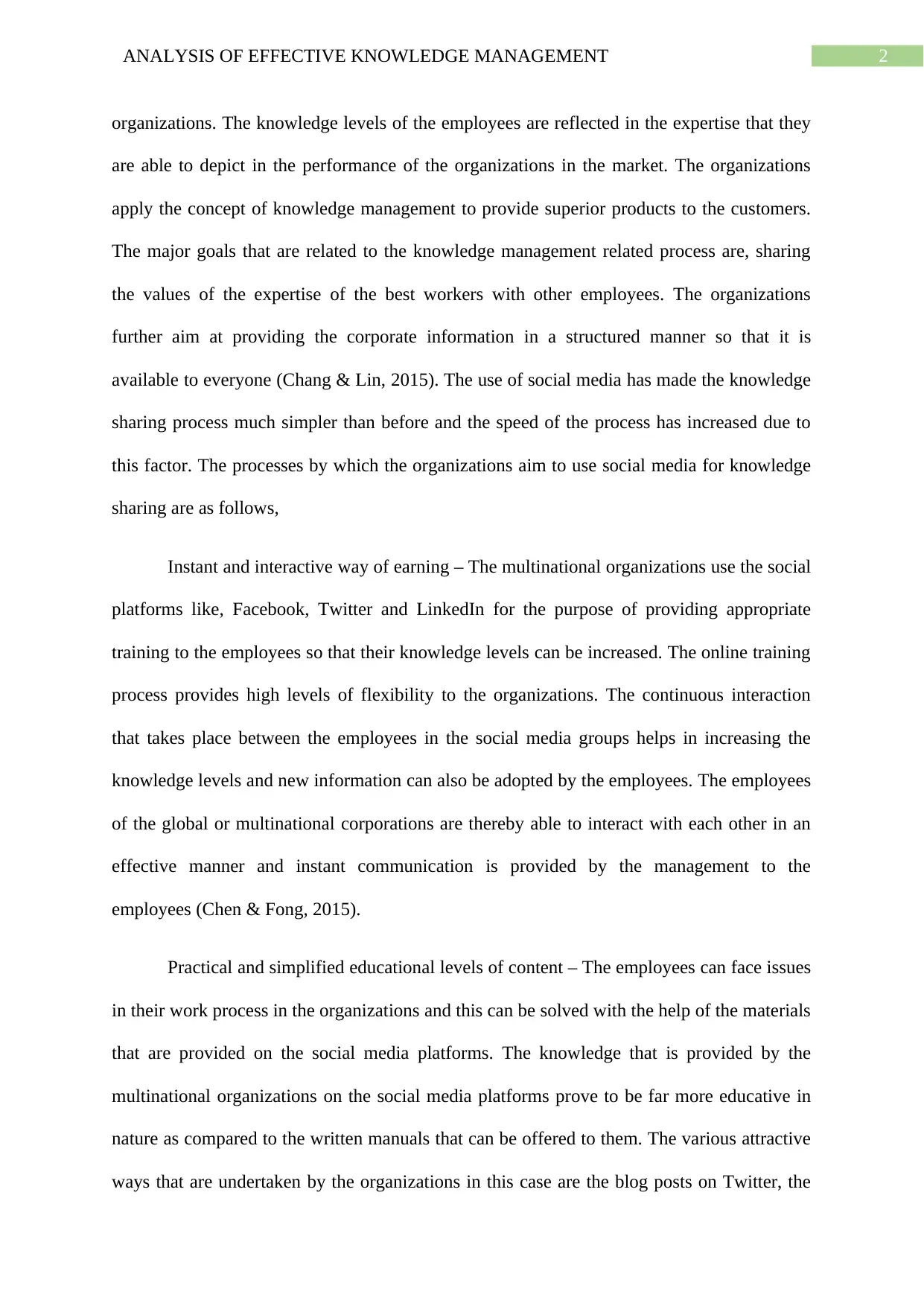
2ANALYSIS OF EFFECTIVE KNOWLEDGE MANAGEMENT
organizations. The knowledge levels of the employees are reflected in the expertise that they
are able to depict in the performance of the organizations in the market. The organizations
apply the concept of knowledge management to provide superior products to the customers.
The major goals that are related to the knowledge management related process are, sharing
the values of the expertise of the best workers with other employees. The organizations
further aim at providing the corporate information in a structured manner so that it is
available to everyone (Chang & Lin, 2015). The use of social media has made the knowledge
sharing process much simpler than before and the speed of the process has increased due to
this factor. The processes by which the organizations aim to use social media for knowledge
sharing are as follows,
Instant and interactive way of earning – The multinational organizations use the social
platforms like, Facebook, Twitter and LinkedIn for the purpose of providing appropriate
training to the employees so that their knowledge levels can be increased. The online training
process provides high levels of flexibility to the organizations. The continuous interaction
that takes place between the employees in the social media groups helps in increasing the
knowledge levels and new information can also be adopted by the employees. The employees
of the global or multinational corporations are thereby able to interact with each other in an
effective manner and instant communication is provided by the management to the
employees (Chen & Fong, 2015).
Practical and simplified educational levels of content – The employees can face issues
in their work process in the organizations and this can be solved with the help of the materials
that are provided on the social media platforms. The knowledge that is provided by the
multinational organizations on the social media platforms prove to be far more educative in
nature as compared to the written manuals that can be offered to them. The various attractive
ways that are undertaken by the organizations in this case are the blog posts on Twitter, the
organizations. The knowledge levels of the employees are reflected in the expertise that they
are able to depict in the performance of the organizations in the market. The organizations
apply the concept of knowledge management to provide superior products to the customers.
The major goals that are related to the knowledge management related process are, sharing
the values of the expertise of the best workers with other employees. The organizations
further aim at providing the corporate information in a structured manner so that it is
available to everyone (Chang & Lin, 2015). The use of social media has made the knowledge
sharing process much simpler than before and the speed of the process has increased due to
this factor. The processes by which the organizations aim to use social media for knowledge
sharing are as follows,
Instant and interactive way of earning – The multinational organizations use the social
platforms like, Facebook, Twitter and LinkedIn for the purpose of providing appropriate
training to the employees so that their knowledge levels can be increased. The online training
process provides high levels of flexibility to the organizations. The continuous interaction
that takes place between the employees in the social media groups helps in increasing the
knowledge levels and new information can also be adopted by the employees. The employees
of the global or multinational corporations are thereby able to interact with each other in an
effective manner and instant communication is provided by the management to the
employees (Chen & Fong, 2015).
Practical and simplified educational levels of content – The employees can face issues
in their work process in the organizations and this can be solved with the help of the materials
that are provided on the social media platforms. The knowledge that is provided by the
multinational organizations on the social media platforms prove to be far more educative in
nature as compared to the written manuals that can be offered to them. The various attractive
ways that are undertaken by the organizations in this case are the blog posts on Twitter, the
⊘ This is a preview!⊘
Do you want full access?
Subscribe today to unlock all pages.

Trusted by 1+ million students worldwide
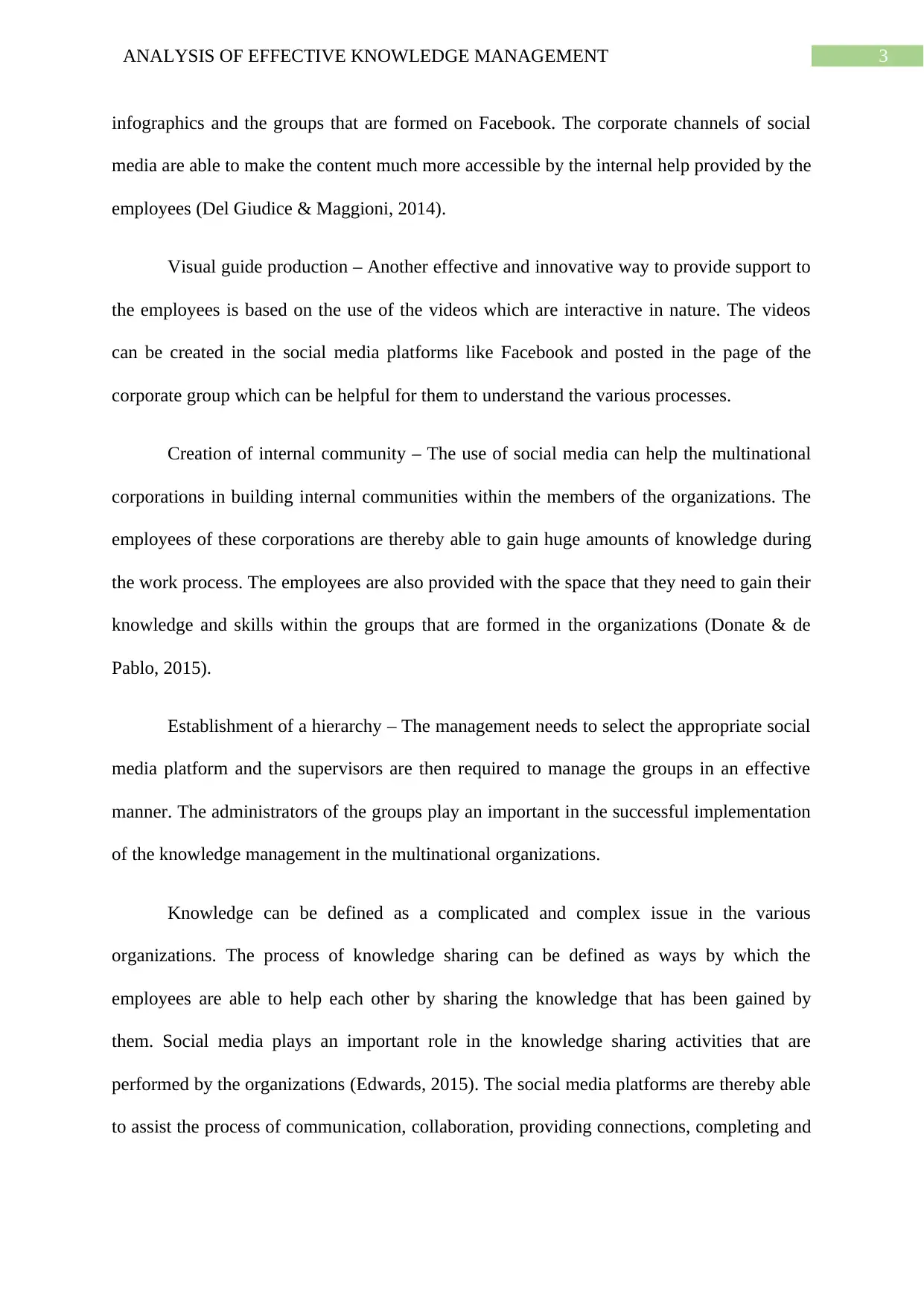
3ANALYSIS OF EFFECTIVE KNOWLEDGE MANAGEMENT
infographics and the groups that are formed on Facebook. The corporate channels of social
media are able to make the content much more accessible by the internal help provided by the
employees (Del Giudice & Maggioni, 2014).
Visual guide production – Another effective and innovative way to provide support to
the employees is based on the use of the videos which are interactive in nature. The videos
can be created in the social media platforms like Facebook and posted in the page of the
corporate group which can be helpful for them to understand the various processes.
Creation of internal community – The use of social media can help the multinational
corporations in building internal communities within the members of the organizations. The
employees of these corporations are thereby able to gain huge amounts of knowledge during
the work process. The employees are also provided with the space that they need to gain their
knowledge and skills within the groups that are formed in the organizations (Donate & de
Pablo, 2015).
Establishment of a hierarchy – The management needs to select the appropriate social
media platform and the supervisors are then required to manage the groups in an effective
manner. The administrators of the groups play an important in the successful implementation
of the knowledge management in the multinational organizations.
Knowledge can be defined as a complicated and complex issue in the various
organizations. The process of knowledge sharing can be defined as ways by which the
employees are able to help each other by sharing the knowledge that has been gained by
them. Social media plays an important role in the knowledge sharing activities that are
performed by the organizations (Edwards, 2015). The social media platforms are thereby able
to assist the process of communication, collaboration, providing connections, completing and
infographics and the groups that are formed on Facebook. The corporate channels of social
media are able to make the content much more accessible by the internal help provided by the
employees (Del Giudice & Maggioni, 2014).
Visual guide production – Another effective and innovative way to provide support to
the employees is based on the use of the videos which are interactive in nature. The videos
can be created in the social media platforms like Facebook and posted in the page of the
corporate group which can be helpful for them to understand the various processes.
Creation of internal community – The use of social media can help the multinational
corporations in building internal communities within the members of the organizations. The
employees of these corporations are thereby able to gain huge amounts of knowledge during
the work process. The employees are also provided with the space that they need to gain their
knowledge and skills within the groups that are formed in the organizations (Donate & de
Pablo, 2015).
Establishment of a hierarchy – The management needs to select the appropriate social
media platform and the supervisors are then required to manage the groups in an effective
manner. The administrators of the groups play an important in the successful implementation
of the knowledge management in the multinational organizations.
Knowledge can be defined as a complicated and complex issue in the various
organizations. The process of knowledge sharing can be defined as ways by which the
employees are able to help each other by sharing the knowledge that has been gained by
them. Social media plays an important role in the knowledge sharing activities that are
performed by the organizations (Edwards, 2015). The social media platforms are thereby able
to assist the process of communication, collaboration, providing connections, completing and
Paraphrase This Document
Need a fresh take? Get an instant paraphrase of this document with our AI Paraphraser
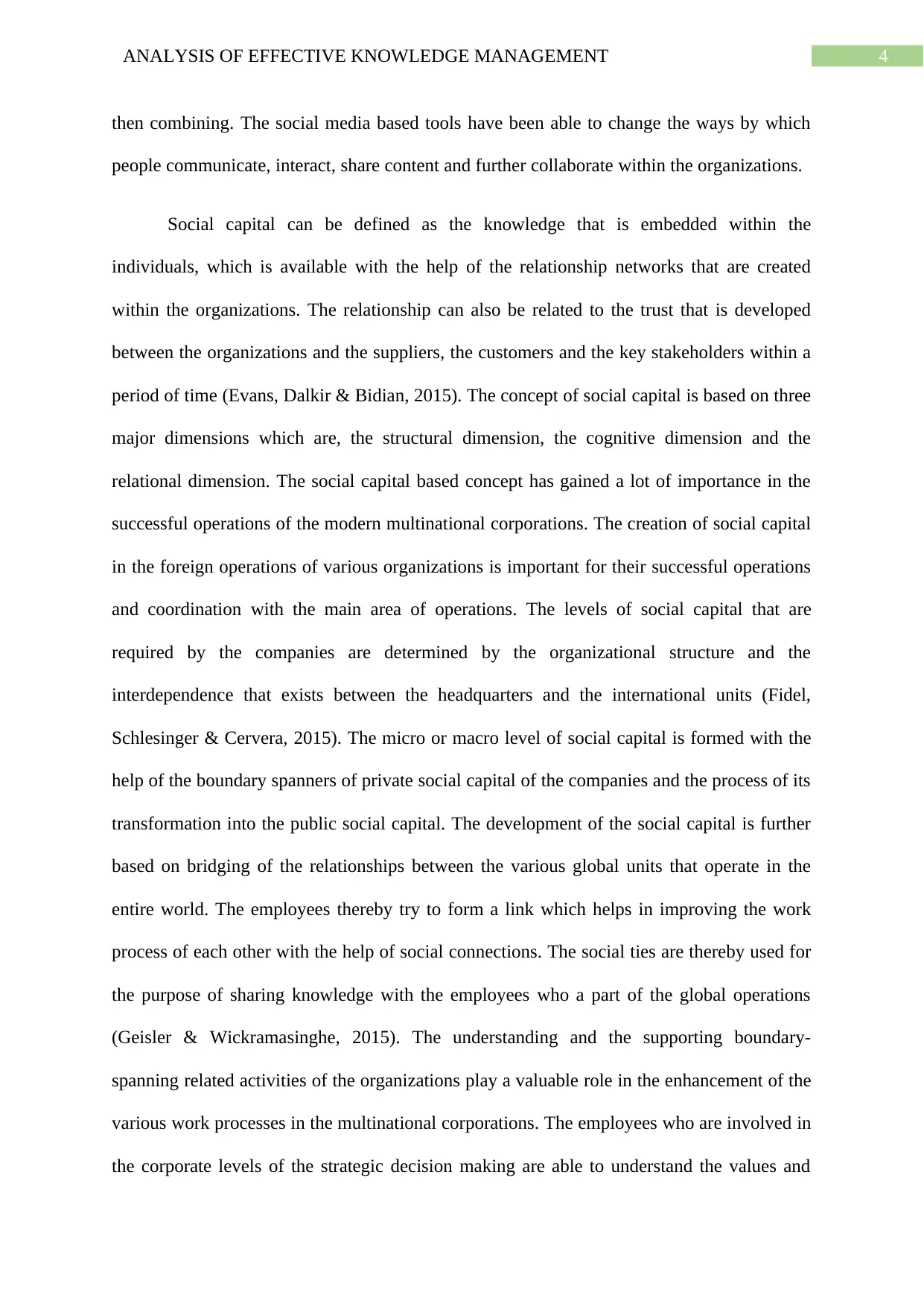
4ANALYSIS OF EFFECTIVE KNOWLEDGE MANAGEMENT
then combining. The social media based tools have been able to change the ways by which
people communicate, interact, share content and further collaborate within the organizations.
Social capital can be defined as the knowledge that is embedded within the
individuals, which is available with the help of the relationship networks that are created
within the organizations. The relationship can also be related to the trust that is developed
between the organizations and the suppliers, the customers and the key stakeholders within a
period of time (Evans, Dalkir & Bidian, 2015). The concept of social capital is based on three
major dimensions which are, the structural dimension, the cognitive dimension and the
relational dimension. The social capital based concept has gained a lot of importance in the
successful operations of the modern multinational corporations. The creation of social capital
in the foreign operations of various organizations is important for their successful operations
and coordination with the main area of operations. The levels of social capital that are
required by the companies are determined by the organizational structure and the
interdependence that exists between the headquarters and the international units (Fidel,
Schlesinger & Cervera, 2015). The micro or macro level of social capital is formed with the
help of the boundary spanners of private social capital of the companies and the process of its
transformation into the public social capital. The development of the social capital is further
based on bridging of the relationships between the various global units that operate in the
entire world. The employees thereby try to form a link which helps in improving the work
process of each other with the help of social connections. The social ties are thereby used for
the purpose of sharing knowledge with the employees who a part of the global operations
(Geisler & Wickramasinghe, 2015). The understanding and the supporting boundary-
spanning related activities of the organizations play a valuable role in the enhancement of the
various work processes in the multinational corporations. The employees who are involved in
the corporate levels of the strategic decision making are able to understand the values and
then combining. The social media based tools have been able to change the ways by which
people communicate, interact, share content and further collaborate within the organizations.
Social capital can be defined as the knowledge that is embedded within the
individuals, which is available with the help of the relationship networks that are created
within the organizations. The relationship can also be related to the trust that is developed
between the organizations and the suppliers, the customers and the key stakeholders within a
period of time (Evans, Dalkir & Bidian, 2015). The concept of social capital is based on three
major dimensions which are, the structural dimension, the cognitive dimension and the
relational dimension. The social capital based concept has gained a lot of importance in the
successful operations of the modern multinational corporations. The creation of social capital
in the foreign operations of various organizations is important for their successful operations
and coordination with the main area of operations. The levels of social capital that are
required by the companies are determined by the organizational structure and the
interdependence that exists between the headquarters and the international units (Fidel,
Schlesinger & Cervera, 2015). The micro or macro level of social capital is formed with the
help of the boundary spanners of private social capital of the companies and the process of its
transformation into the public social capital. The development of the social capital is further
based on bridging of the relationships between the various global units that operate in the
entire world. The employees thereby try to form a link which helps in improving the work
process of each other with the help of social connections. The social ties are thereby used for
the purpose of sharing knowledge with the employees who a part of the global operations
(Geisler & Wickramasinghe, 2015). The understanding and the supporting boundary-
spanning related activities of the organizations play a valuable role in the enhancement of the
various work processes in the multinational corporations. The employees who are involved in
the corporate levels of the strategic decision making are able to understand the values and
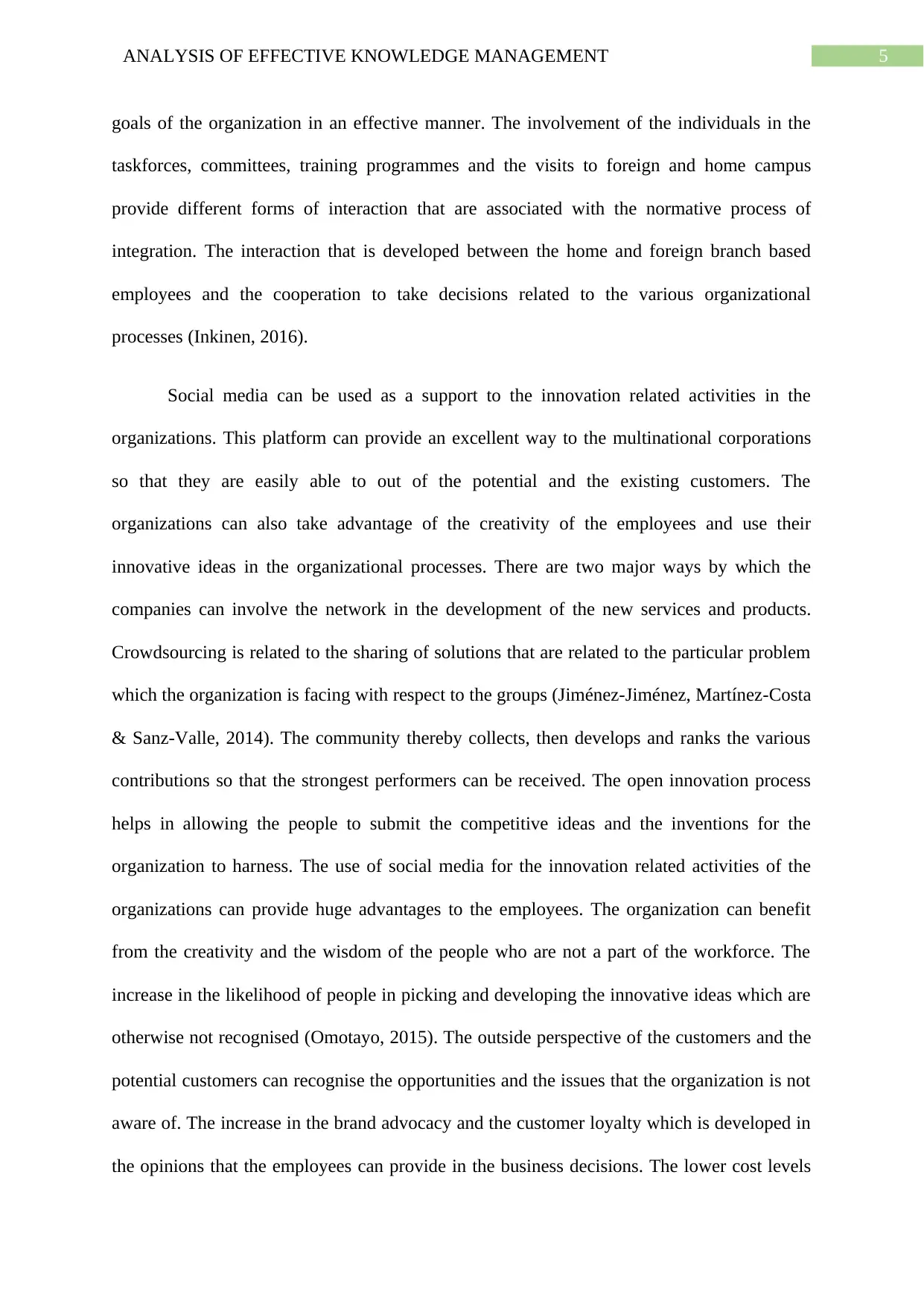
5ANALYSIS OF EFFECTIVE KNOWLEDGE MANAGEMENT
goals of the organization in an effective manner. The involvement of the individuals in the
taskforces, committees, training programmes and the visits to foreign and home campus
provide different forms of interaction that are associated with the normative process of
integration. The interaction that is developed between the home and foreign branch based
employees and the cooperation to take decisions related to the various organizational
processes (Inkinen, 2016).
Social media can be used as a support to the innovation related activities in the
organizations. This platform can provide an excellent way to the multinational corporations
so that they are easily able to out of the potential and the existing customers. The
organizations can also take advantage of the creativity of the employees and use their
innovative ideas in the organizational processes. There are two major ways by which the
companies can involve the network in the development of the new services and products.
Crowdsourcing is related to the sharing of solutions that are related to the particular problem
which the organization is facing with respect to the groups (Jiménez-Jiménez, Martínez-Costa
& Sanz-Valle, 2014). The community thereby collects, then develops and ranks the various
contributions so that the strongest performers can be received. The open innovation process
helps in allowing the people to submit the competitive ideas and the inventions for the
organization to harness. The use of social media for the innovation related activities of the
organizations can provide huge advantages to the employees. The organization can benefit
from the creativity and the wisdom of the people who are not a part of the workforce. The
increase in the likelihood of people in picking and developing the innovative ideas which are
otherwise not recognised (Omotayo, 2015). The outside perspective of the customers and the
potential customers can recognise the opportunities and the issues that the organization is not
aware of. The increase in the brand advocacy and the customer loyalty which is developed in
the opinions that the employees can provide in the business decisions. The lower cost levels
goals of the organization in an effective manner. The involvement of the individuals in the
taskforces, committees, training programmes and the visits to foreign and home campus
provide different forms of interaction that are associated with the normative process of
integration. The interaction that is developed between the home and foreign branch based
employees and the cooperation to take decisions related to the various organizational
processes (Inkinen, 2016).
Social media can be used as a support to the innovation related activities in the
organizations. This platform can provide an excellent way to the multinational corporations
so that they are easily able to out of the potential and the existing customers. The
organizations can also take advantage of the creativity of the employees and use their
innovative ideas in the organizational processes. There are two major ways by which the
companies can involve the network in the development of the new services and products.
Crowdsourcing is related to the sharing of solutions that are related to the particular problem
which the organization is facing with respect to the groups (Jiménez-Jiménez, Martínez-Costa
& Sanz-Valle, 2014). The community thereby collects, then develops and ranks the various
contributions so that the strongest performers can be received. The open innovation process
helps in allowing the people to submit the competitive ideas and the inventions for the
organization to harness. The use of social media for the innovation related activities of the
organizations can provide huge advantages to the employees. The organization can benefit
from the creativity and the wisdom of the people who are not a part of the workforce. The
increase in the likelihood of people in picking and developing the innovative ideas which are
otherwise not recognised (Omotayo, 2015). The outside perspective of the customers and the
potential customers can recognise the opportunities and the issues that the organization is not
aware of. The increase in the brand advocacy and the customer loyalty which is developed in
the opinions that the employees can provide in the business decisions. The lower cost levels
⊘ This is a preview!⊘
Do you want full access?
Subscribe today to unlock all pages.

Trusted by 1+ million students worldwide
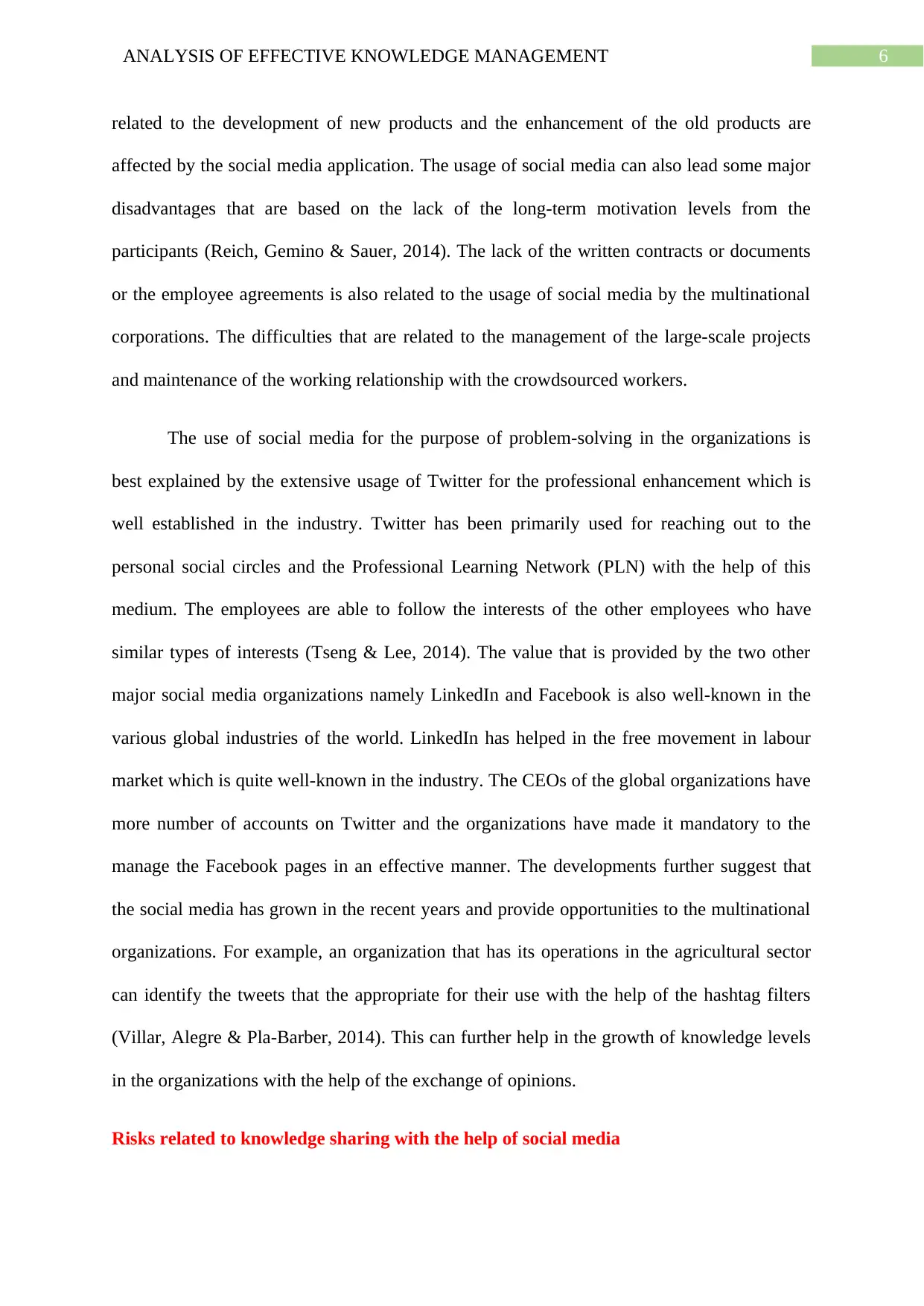
6ANALYSIS OF EFFECTIVE KNOWLEDGE MANAGEMENT
related to the development of new products and the enhancement of the old products are
affected by the social media application. The usage of social media can also lead some major
disadvantages that are based on the lack of the long-term motivation levels from the
participants (Reich, Gemino & Sauer, 2014). The lack of the written contracts or documents
or the employee agreements is also related to the usage of social media by the multinational
corporations. The difficulties that are related to the management of the large-scale projects
and maintenance of the working relationship with the crowdsourced workers.
The use of social media for the purpose of problem-solving in the organizations is
best explained by the extensive usage of Twitter for the professional enhancement which is
well established in the industry. Twitter has been primarily used for reaching out to the
personal social circles and the Professional Learning Network (PLN) with the help of this
medium. The employees are able to follow the interests of the other employees who have
similar types of interests (Tseng & Lee, 2014). The value that is provided by the two other
major social media organizations namely LinkedIn and Facebook is also well-known in the
various global industries of the world. LinkedIn has helped in the free movement in labour
market which is quite well-known in the industry. The CEOs of the global organizations have
more number of accounts on Twitter and the organizations have made it mandatory to the
manage the Facebook pages in an effective manner. The developments further suggest that
the social media has grown in the recent years and provide opportunities to the multinational
organizations. For example, an organization that has its operations in the agricultural sector
can identify the tweets that the appropriate for their use with the help of the hashtag filters
(Villar, Alegre & Pla-Barber, 2014). This can further help in the growth of knowledge levels
in the organizations with the help of the exchange of opinions.
Risks related to knowledge sharing with the help of social media
related to the development of new products and the enhancement of the old products are
affected by the social media application. The usage of social media can also lead some major
disadvantages that are based on the lack of the long-term motivation levels from the
participants (Reich, Gemino & Sauer, 2014). The lack of the written contracts or documents
or the employee agreements is also related to the usage of social media by the multinational
corporations. The difficulties that are related to the management of the large-scale projects
and maintenance of the working relationship with the crowdsourced workers.
The use of social media for the purpose of problem-solving in the organizations is
best explained by the extensive usage of Twitter for the professional enhancement which is
well established in the industry. Twitter has been primarily used for reaching out to the
personal social circles and the Professional Learning Network (PLN) with the help of this
medium. The employees are able to follow the interests of the other employees who have
similar types of interests (Tseng & Lee, 2014). The value that is provided by the two other
major social media organizations namely LinkedIn and Facebook is also well-known in the
various global industries of the world. LinkedIn has helped in the free movement in labour
market which is quite well-known in the industry. The CEOs of the global organizations have
more number of accounts on Twitter and the organizations have made it mandatory to the
manage the Facebook pages in an effective manner. The developments further suggest that
the social media has grown in the recent years and provide opportunities to the multinational
organizations. For example, an organization that has its operations in the agricultural sector
can identify the tweets that the appropriate for their use with the help of the hashtag filters
(Villar, Alegre & Pla-Barber, 2014). This can further help in the growth of knowledge levels
in the organizations with the help of the exchange of opinions.
Risks related to knowledge sharing with the help of social media
Paraphrase This Document
Need a fresh take? Get an instant paraphrase of this document with our AI Paraphraser
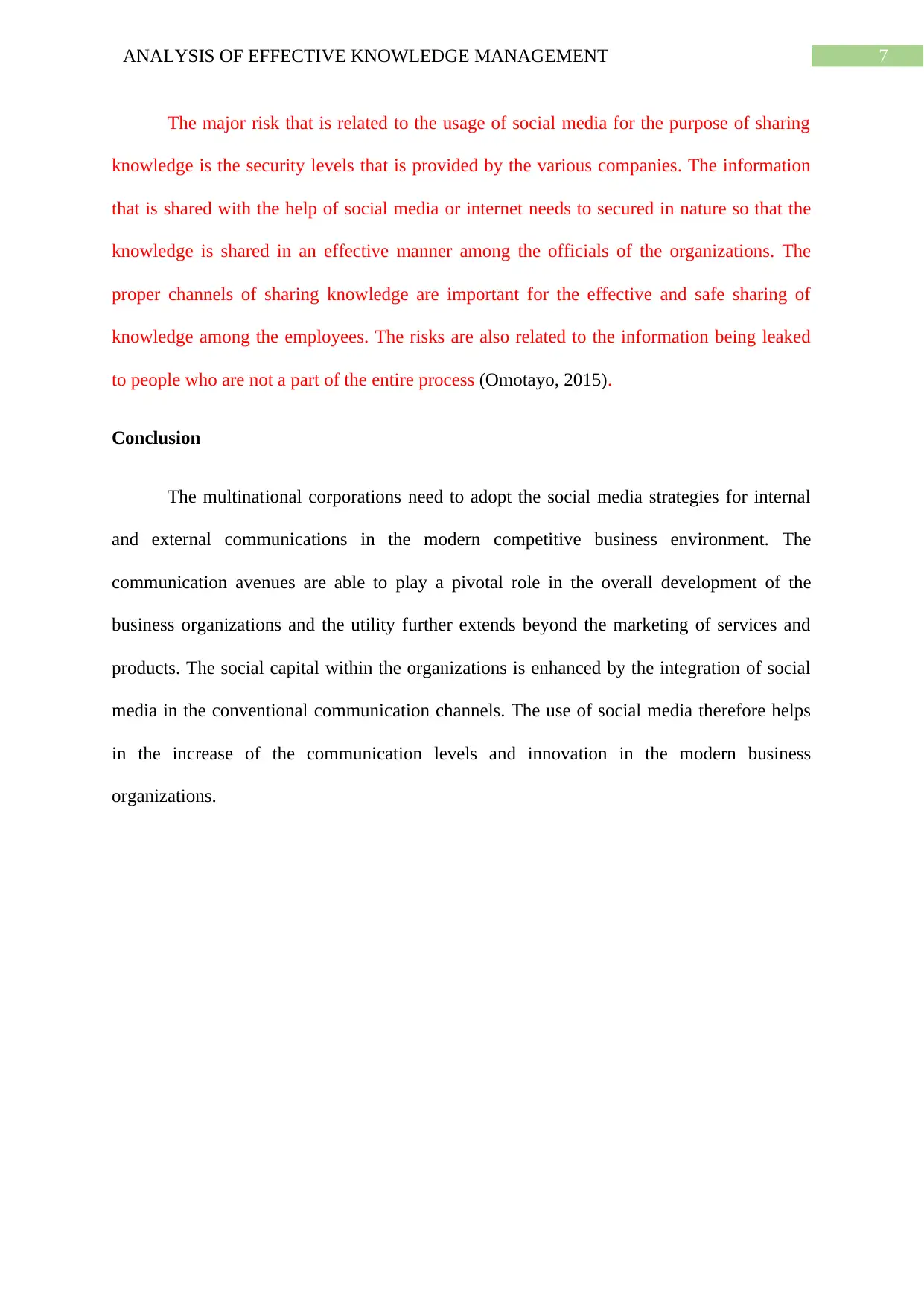
7ANALYSIS OF EFFECTIVE KNOWLEDGE MANAGEMENT
The major risk that is related to the usage of social media for the purpose of sharing
knowledge is the security levels that is provided by the various companies. The information
that is shared with the help of social media or internet needs to secured in nature so that the
knowledge is shared in an effective manner among the officials of the organizations. The
proper channels of sharing knowledge are important for the effective and safe sharing of
knowledge among the employees. The risks are also related to the information being leaked
to people who are not a part of the entire process (Omotayo, 2015).
Conclusion
The multinational corporations need to adopt the social media strategies for internal
and external communications in the modern competitive business environment. The
communication avenues are able to play a pivotal role in the overall development of the
business organizations and the utility further extends beyond the marketing of services and
products. The social capital within the organizations is enhanced by the integration of social
media in the conventional communication channels. The use of social media therefore helps
in the increase of the communication levels and innovation in the modern business
organizations.
The major risk that is related to the usage of social media for the purpose of sharing
knowledge is the security levels that is provided by the various companies. The information
that is shared with the help of social media or internet needs to secured in nature so that the
knowledge is shared in an effective manner among the officials of the organizations. The
proper channels of sharing knowledge are important for the effective and safe sharing of
knowledge among the employees. The risks are also related to the information being leaked
to people who are not a part of the entire process (Omotayo, 2015).
Conclusion
The multinational corporations need to adopt the social media strategies for internal
and external communications in the modern competitive business environment. The
communication avenues are able to play a pivotal role in the overall development of the
business organizations and the utility further extends beyond the marketing of services and
products. The social capital within the organizations is enhanced by the integration of social
media in the conventional communication channels. The use of social media therefore helps
in the increase of the communication levels and innovation in the modern business
organizations.
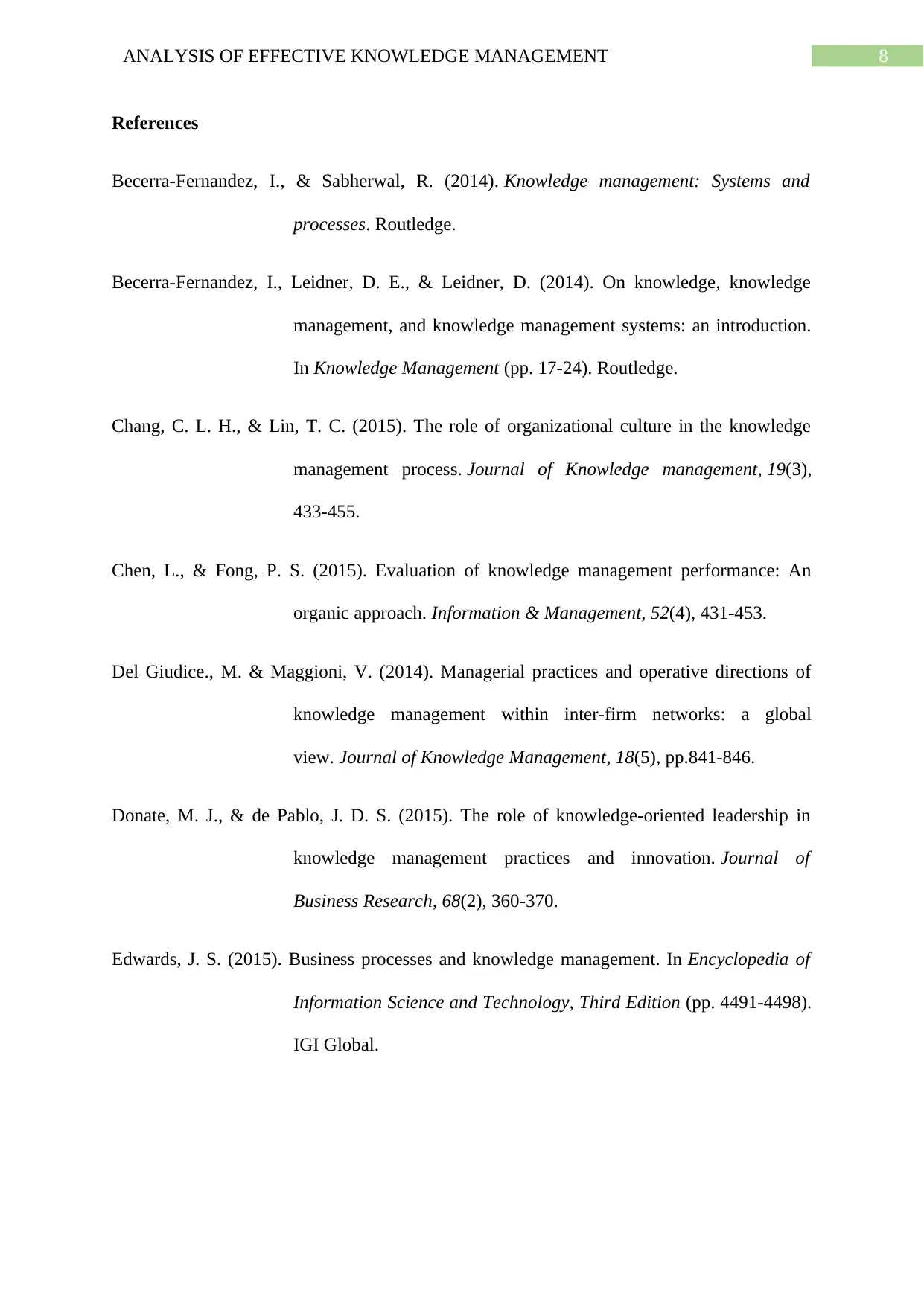
8ANALYSIS OF EFFECTIVE KNOWLEDGE MANAGEMENT
References
Becerra-Fernandez, I., & Sabherwal, R. (2014). Knowledge management: Systems and
processes. Routledge.
Becerra-Fernandez, I., Leidner, D. E., & Leidner, D. (2014). On knowledge, knowledge
management, and knowledge management systems: an introduction.
In Knowledge Management (pp. 17-24). Routledge.
Chang, C. L. H., & Lin, T. C. (2015). The role of organizational culture in the knowledge
management process. Journal of Knowledge management, 19(3),
433-455.
Chen, L., & Fong, P. S. (2015). Evaluation of knowledge management performance: An
organic approach. Information & Management, 52(4), 431-453.
Del Giudice., M. & Maggioni, V. (2014). Managerial practices and operative directions of
knowledge management within inter-firm networks: a global
view. Journal of Knowledge Management, 18(5), pp.841-846.
Donate, M. J., & de Pablo, J. D. S. (2015). The role of knowledge-oriented leadership in
knowledge management practices and innovation. Journal of
Business Research, 68(2), 360-370.
Edwards, J. S. (2015). Business processes and knowledge management. In Encyclopedia of
Information Science and Technology, Third Edition (pp. 4491-4498).
IGI Global.
References
Becerra-Fernandez, I., & Sabherwal, R. (2014). Knowledge management: Systems and
processes. Routledge.
Becerra-Fernandez, I., Leidner, D. E., & Leidner, D. (2014). On knowledge, knowledge
management, and knowledge management systems: an introduction.
In Knowledge Management (pp. 17-24). Routledge.
Chang, C. L. H., & Lin, T. C. (2015). The role of organizational culture in the knowledge
management process. Journal of Knowledge management, 19(3),
433-455.
Chen, L., & Fong, P. S. (2015). Evaluation of knowledge management performance: An
organic approach. Information & Management, 52(4), 431-453.
Del Giudice., M. & Maggioni, V. (2014). Managerial practices and operative directions of
knowledge management within inter-firm networks: a global
view. Journal of Knowledge Management, 18(5), pp.841-846.
Donate, M. J., & de Pablo, J. D. S. (2015). The role of knowledge-oriented leadership in
knowledge management practices and innovation. Journal of
Business Research, 68(2), 360-370.
Edwards, J. S. (2015). Business processes and knowledge management. In Encyclopedia of
Information Science and Technology, Third Edition (pp. 4491-4498).
IGI Global.
⊘ This is a preview!⊘
Do you want full access?
Subscribe today to unlock all pages.

Trusted by 1+ million students worldwide
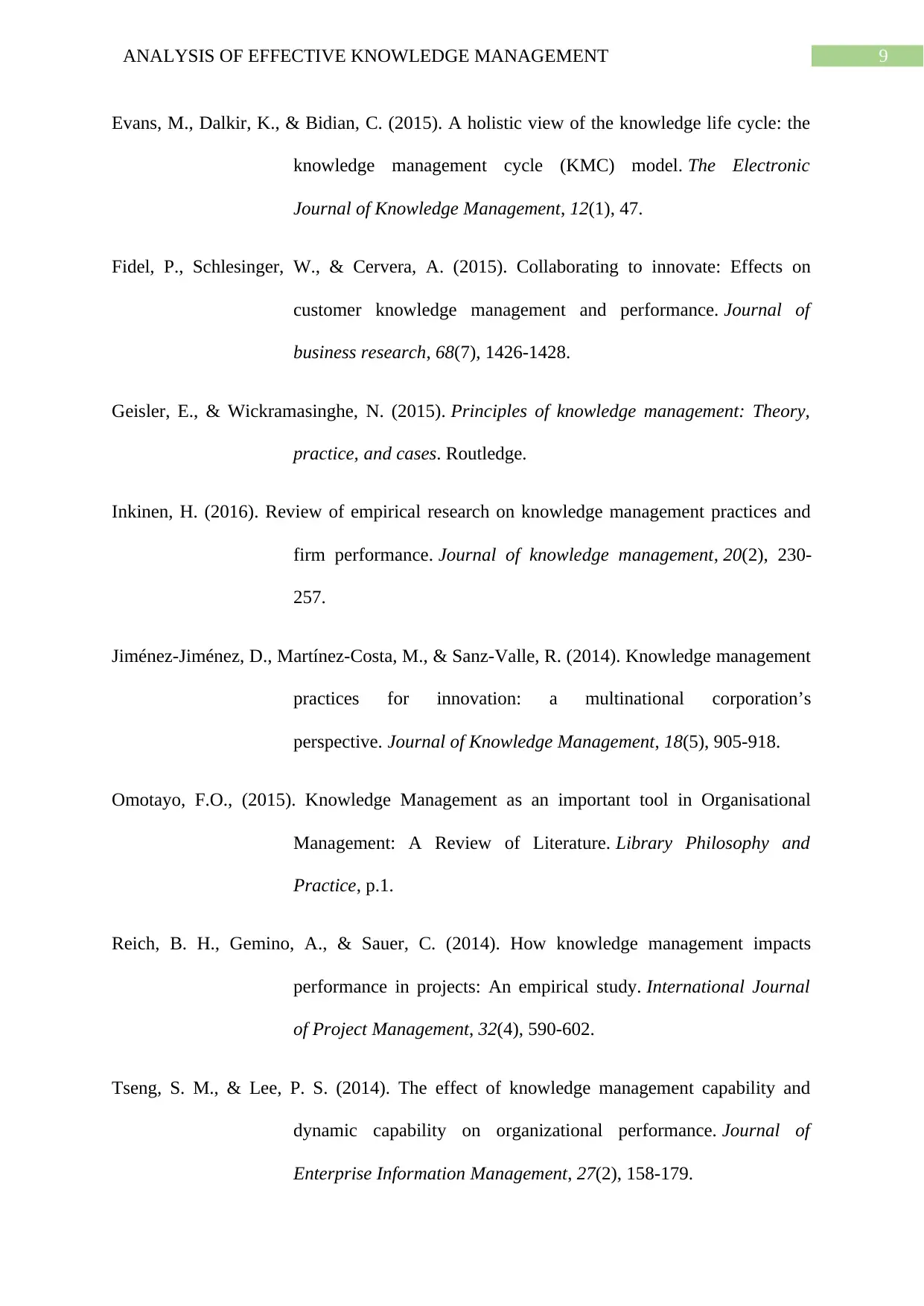
9ANALYSIS OF EFFECTIVE KNOWLEDGE MANAGEMENT
Evans, M., Dalkir, K., & Bidian, C. (2015). A holistic view of the knowledge life cycle: the
knowledge management cycle (KMC) model. The Electronic
Journal of Knowledge Management, 12(1), 47.
Fidel, P., Schlesinger, W., & Cervera, A. (2015). Collaborating to innovate: Effects on
customer knowledge management and performance. Journal of
business research, 68(7), 1426-1428.
Geisler, E., & Wickramasinghe, N. (2015). Principles of knowledge management: Theory,
practice, and cases. Routledge.
Inkinen, H. (2016). Review of empirical research on knowledge management practices and
firm performance. Journal of knowledge management, 20(2), 230-
257.
Jiménez-Jiménez, D., Martínez-Costa, M., & Sanz-Valle, R. (2014). Knowledge management
practices for innovation: a multinational corporation’s
perspective. Journal of Knowledge Management, 18(5), 905-918.
Omotayo, F.O., (2015). Knowledge Management as an important tool in Organisational
Management: A Review of Literature. Library Philosophy and
Practice, p.1.
Reich, B. H., Gemino, A., & Sauer, C. (2014). How knowledge management impacts
performance in projects: An empirical study. International Journal
of Project Management, 32(4), 590-602.
Tseng, S. M., & Lee, P. S. (2014). The effect of knowledge management capability and
dynamic capability on organizational performance. Journal of
Enterprise Information Management, 27(2), 158-179.
Evans, M., Dalkir, K., & Bidian, C. (2015). A holistic view of the knowledge life cycle: the
knowledge management cycle (KMC) model. The Electronic
Journal of Knowledge Management, 12(1), 47.
Fidel, P., Schlesinger, W., & Cervera, A. (2015). Collaborating to innovate: Effects on
customer knowledge management and performance. Journal of
business research, 68(7), 1426-1428.
Geisler, E., & Wickramasinghe, N. (2015). Principles of knowledge management: Theory,
practice, and cases. Routledge.
Inkinen, H. (2016). Review of empirical research on knowledge management practices and
firm performance. Journal of knowledge management, 20(2), 230-
257.
Jiménez-Jiménez, D., Martínez-Costa, M., & Sanz-Valle, R. (2014). Knowledge management
practices for innovation: a multinational corporation’s
perspective. Journal of Knowledge Management, 18(5), 905-918.
Omotayo, F.O., (2015). Knowledge Management as an important tool in Organisational
Management: A Review of Literature. Library Philosophy and
Practice, p.1.
Reich, B. H., Gemino, A., & Sauer, C. (2014). How knowledge management impacts
performance in projects: An empirical study. International Journal
of Project Management, 32(4), 590-602.
Tseng, S. M., & Lee, P. S. (2014). The effect of knowledge management capability and
dynamic capability on organizational performance. Journal of
Enterprise Information Management, 27(2), 158-179.
Paraphrase This Document
Need a fresh take? Get an instant paraphrase of this document with our AI Paraphraser
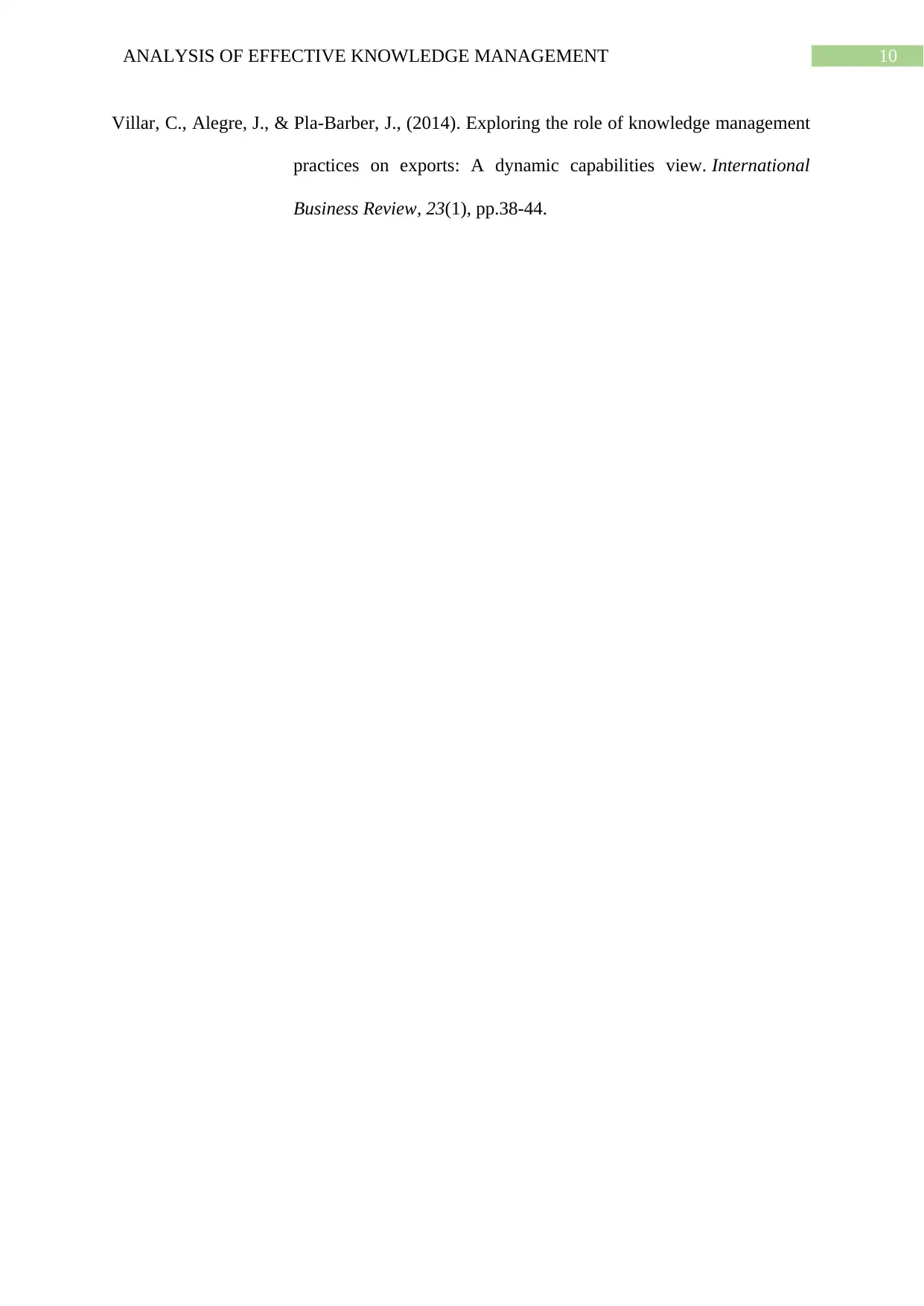
10ANALYSIS OF EFFECTIVE KNOWLEDGE MANAGEMENT
Villar, C., Alegre, J., & Pla-Barber, J., (2014). Exploring the role of knowledge management
practices on exports: A dynamic capabilities view. International
Business Review, 23(1), pp.38-44.
Villar, C., Alegre, J., & Pla-Barber, J., (2014). Exploring the role of knowledge management
practices on exports: A dynamic capabilities view. International
Business Review, 23(1), pp.38-44.
1 out of 11
Related Documents
Your All-in-One AI-Powered Toolkit for Academic Success.
+13062052269
info@desklib.com
Available 24*7 on WhatsApp / Email
![[object Object]](/_next/static/media/star-bottom.7253800d.svg)
Unlock your academic potential
Copyright © 2020–2026 A2Z Services. All Rights Reserved. Developed and managed by ZUCOL.





